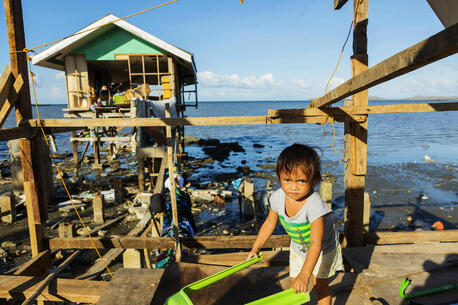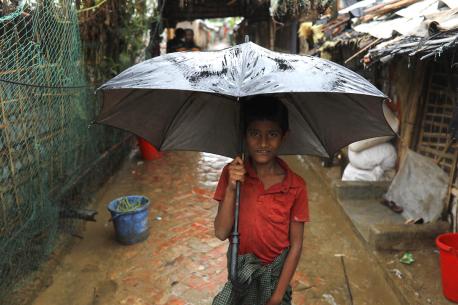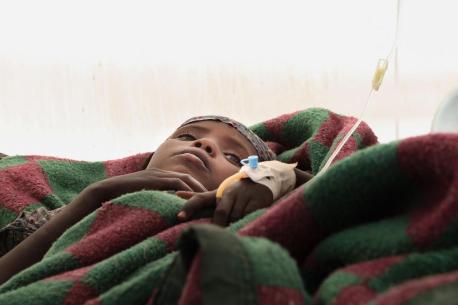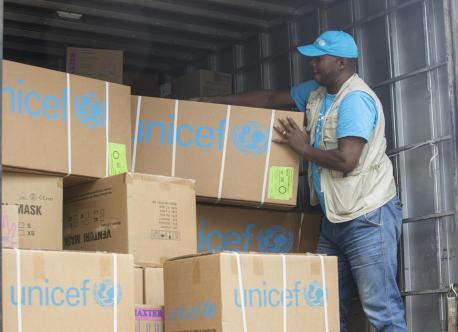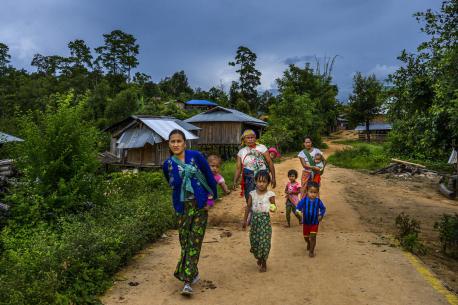
UNICEF in Myanmar
Conflict, rising poverty and a recent cyclone disaster have made life increasingly difficult in many parts of Myanmar. Despite security challenges, UNICEF is reaching hundreds of thousands of vulnerable children and families with critical services and support.
Crisis in Myanmar
A civil war that erupted following a military coup in 2021 continues to fuel a severe humanitarian crisis in Myanmar, a country of 55 million people in Southeast Asia once called Burma.
The ongoing conflict has disrupted health care and education, destroyed critical infrastructure and exposed millions of children to trauma, malnutrition and grave rights violations. Hundreds of children have been killed by armed actors or injured by landmines and explosive remnants of war.
Close to 2 million people are internally displaced inside the country. Many live in camps, where they struggle to meet basic needs, where safe water is in short supply, and sanitation and hygiene facilities are inadequate.
More than half of those displaced live in areas that suffered damage when Cyclone Mocha made landfall in May 2023, intensifying their humanitarian needs.
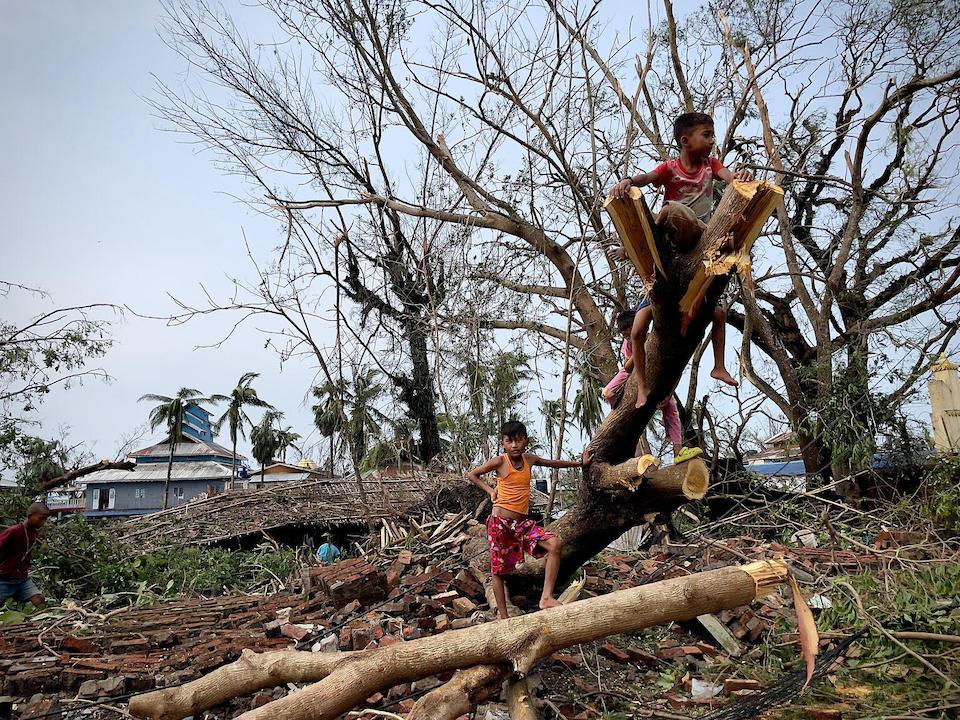
Myanmar is also home to 417,000 stateless Rohingyas, an extremely vulnerable Muslim minority population. Some 940,000 Rohingya refugees from Myanmar — including close to 491,000 children — are currently living in Cox’s Bazar District of Bangladesh, having fled genocide in 2017. Learn how UNICEF is supporting Rohingya refugees and their host communities.
Conflict, insecurity and rising poverty leave many in Myanmar vulnerable
The COVID-19 pandemic only compounded the effects of the civil conflict, helping to push the country's child poverty rate up from 31 percent in 2017 to 53 percent in 2022. Today, the economy remains on the verge of collapse, and inflation is rampant.
An estimated 4.5 million people are seriously struggling, mainly in conflict-affected rural areas that were further devastated by the cyclone. An estimated 500,000 across five states and regions require emergency relief from the cyclone's impacts.
Vulnerable children in Myanmar need health care, education
Children's education is suffering as a result. In many parts of Myanmar, schooling has ground to a halt.
Since conflict erupted in 2021, more than half of Myanmar's professional teachers have been suspended, arrested or have left the profession. Attacks on schools tripled in 2022, and the use of schools as military bases by combatants continues to increase.
An estimated 3.7 million children have limited or no access to learning.
The public health system is also in disarray. More than 1.6 million children are not fully vaccinated against preventable diseases. The nation's measles immunization rate — once an impressive 91 percent — has fallen to 34 percent, dramatically increasing risks of an outbreak.
UNICEF projects that as many as 33,000 children could die from a vaccine-preventable disease in the next year or so.
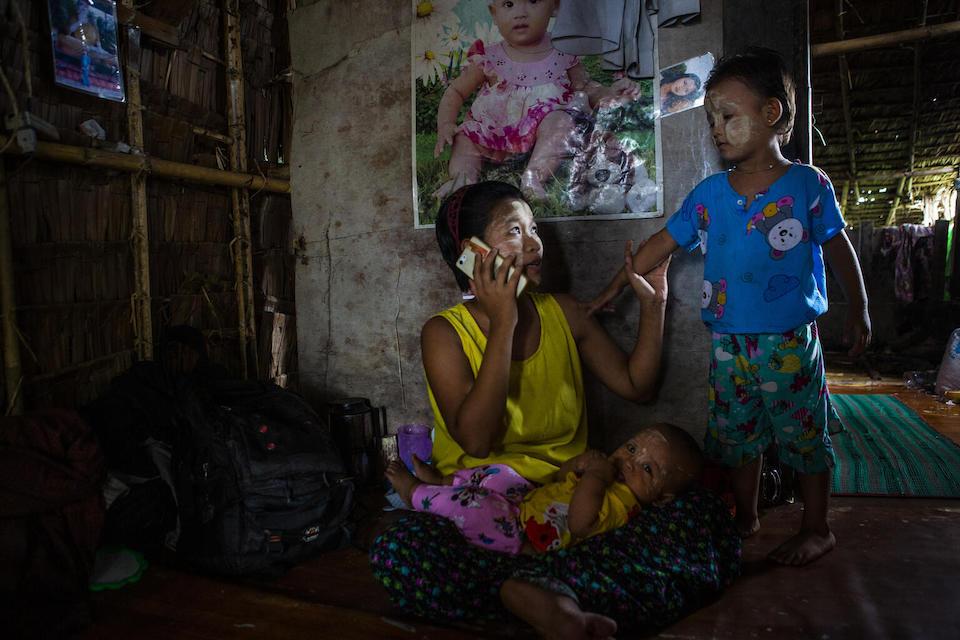
How UNICEF is helping children in Myanmar
The delivery of humanitarian assistance inside Myanmar is constrained by restrictions on both the movement of supplies and the movements of the aid workers who are attempting to deliver it.
Another obstacle: lack of funding. UNICEF's action plan in Myanmar requires significant additional donor support to meet its goals.
Working with community partners, using the resources that are available — and despite security challenges — UNICEF is still reaching children and families in need with a range of health, nutrition and other services and support.
To improve health care for the most vulnerable, UNICEF provides medicines and other essential health supplies — from first aid kids to clean delivery kits to support women during childbirth and community newborn kits; trains public health workers in immunization practices and vaccine management; and works with national health officials to improve child immunization rates.
In communities where basic services are restricted or unaffordable, UNICEF helps fill those gaps by providing emergency health services to pregnant women and children through mobile teams or through tele-consultations with family doctors.
In the wake of Cyclone Mocha, UNICEF stepped up primary health care services with more fixed and mobile clinics and cold chain equipment to strengthen routine immunization in cyclone-affected areas in Rakhine.
To support displaced families living in temporary and long-term sites, in forests and in urban settlements, UNICEF provides medicine, clean drinking water, sanitation and bathing facilities.
In education, UNICEF is able to help kids keep learning even when schools are closed, by training community facilitators to be teachers, and distributing story books and other learning materials. UNICEF also helps upgrade libraries and other community facilities to create safe learning spaces.
Home-based learning is also supported. Hundreds of thousands of children have been reached with these interventions. And UNICEF works with local partners to provide early learning materials in more than 100 ethnic languages and cultures, providing tablets, laptops and digital literacy trainings.
Making a difference in Myanmar: one girl's story
Win Lei, a 12-year-old girl growing up in a small village in Myanmar’s Sagaing Region, says she almost gave up on her dream of being a doctor after her country plunged into war and COVID-19 shut her school down.
Without a reliable internet connection, and anyone to help her overcome technical difficulties, she spent her days helping her parents with household chores and playing football with her friends. By the time UNICEF and a local partner launched a new home-based learning program in her village, she’d been out of school so long, she almost gave up. But with help, she was able to persevere.
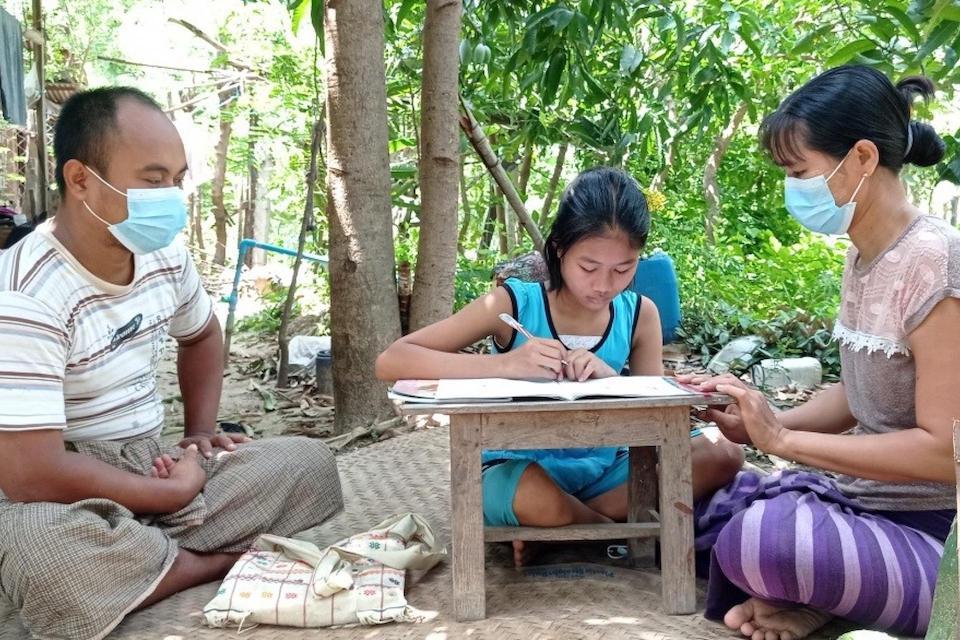
“At first, it was difficult to learn because I was out of touch with the school lessons for a long time,” said Win Lei. “But the community facilitator, U Naing Htut Oo, taught me to be patient. He also gave me support and confidence so that I gradually became interested to learn my lesson.”
Now, she says, she is back on track. “I want to become a doctor,” she says. “I want to help poor people who need health care and treat them free of charge. And I have been studying lessons very hard."
Programs in Myanmar also include nutrition, mental health support
Other priorities for UNICEF's ongoing mission in Myanmar include:
reaching children suffering severe acute malnutrition with Ready-to-Use Therapeutic Food (RUTF)
helping to prevent malnutrition by providing micronutrients and vitamin A supplements and counseling on best infant and young child feeding practices
establishing fixed and mobile Child-Friendly Spaces where children can receive mental health and psychosocial support, and where UNICEF team members can screen and identify of children in need of protection and other services
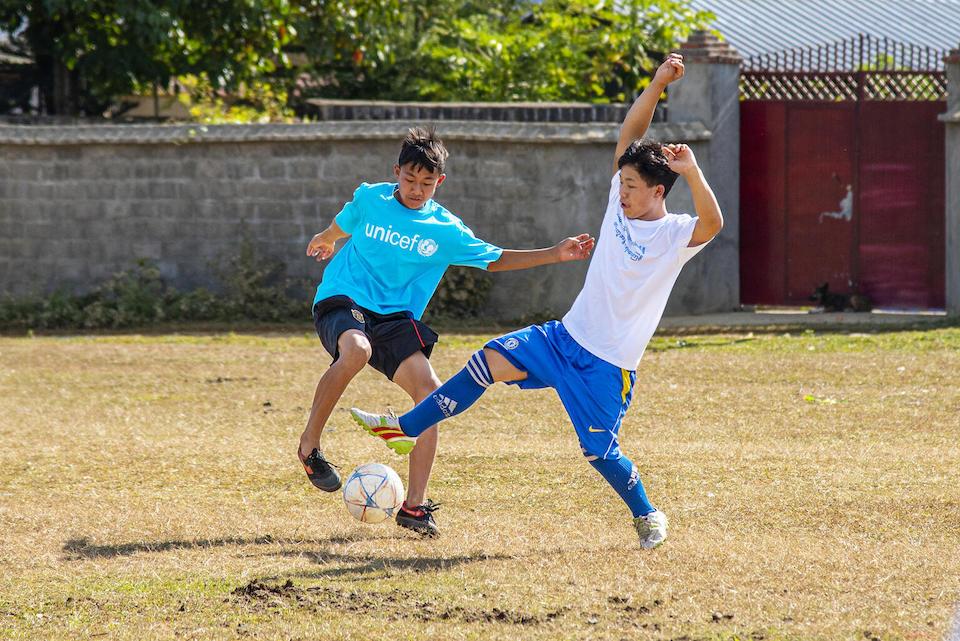
- providing emergency interventions to adolescent survivors of sexual violence, as well as training sessions aimed at promoting positive social and gender norms, life skills and reproductive health education
- supporting local child protection teams working at the village level to strengthen protection systems and reporting pathways and to organize working groups and parenting education training sessions
- establishing humanitarian cash transfer programs to reach pregnant women, children under 2 and their family members with bi-monthly cash transfers in hard-hit informal urban settlements
- readying emergency supplies for distribution when natural disasters strike — as with Cyclone Mocha in May 2023
UNICEF works in over 190 countries and territories to help children get educated, stay healthy, protected and respected. Unrestricted donations give UNICEF the flexibility to direct resources to the most urgent needs.
Support UNICEF's mission. Your contribution makes a difference. Donate today.
